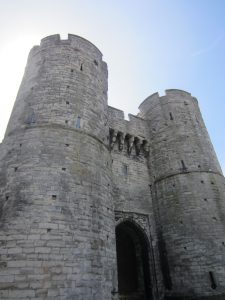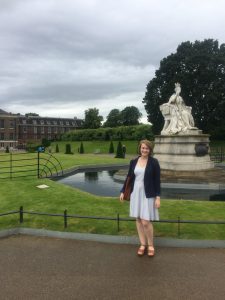During the months of June and July of this year, I explored the realm of Middle English Literature with Professor Dorothy Kim. Working with Professor Kim, I studied medieval manuscripts and analyzed one in particular, Laud 108, to produce a topics map. The topics map is essentially a list of all of the scholarly work that has been written about Laud 108 in the past 100 years. Our goal in creating this map is to make articles, books, and papers more readily available to medievalists hoping to study Laud 108. With an easy to read, organized list of sources, complete with author, year, date, publication, and key words, scholars will be able to streamline and simplify their own research.
As Professor Kim’s research assistant, I also helped her to plan an upcoming conference, “Making Early Middle English”. This is a conference that Professor Kim and her research partner, Professor Williams Boyarin of the University of Victoria, have been organizing and will host together this September at the University of Victoria in British Columbia. My duties relating to the conference have involved setting up and managing social media accounts, communicating with scholars to arrange travel, and finally, writing a paper of my own to present at the conference. Tying in with my topics map research, I have written a paper about one of the texts in Laud 108, Havelok the Dane. During the Making EME conference, I will present my paper as  a part of a panel of scholars.
a part of a panel of scholars.
My conference paper focuses specifically on gender and vulnerability in the Havelok narrative. Using my topics map, I analyzed modern scholarly work about gender and Medieval Literature to interpret this over 600 year old manuscript. While Havelok the Dane is one of the oldest English Romances, I wanted to examine it through a modern lens. Through my own reinterpretation and that of current Havelok scholars, I found that Havelok is a character that combines masculinity and femininity and challenges our perception of the standard “Medieval hero”.
This summer experience has been one I will treasure long after I graduate from Vassar. Not only did I gain invaluable research skills, but my particular Ford experience brought me to London in July, where Professor Kim and I researched at the British Library. Having never traveled to England before, I relished in the experience of studying and living in London for four weeks. Being surrounded by th e rich literary history of London and working in the remarkable environment of the British Library massively enhanced my Ford experience. I am so grateful Professor Kim and the Ford Scholars program for this wonderful summer. Additionally, I am appreciative of the continued support of Vassar in sending me to present at the Making EME conference.
e rich literary history of London and working in the remarkable environment of the British Library massively enhanced my Ford experience. I am so grateful Professor Kim and the Ford Scholars program for this wonderful summer. Additionally, I am appreciative of the continued support of Vassar in sending me to present at the Making EME conference.
